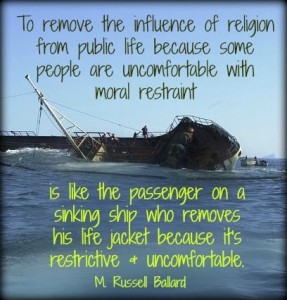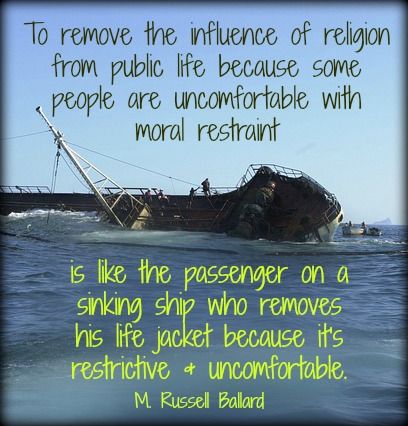As those who believe in God and seek to follow His commandments are working to preserve their religious liberties, there are those who are mocking their efforts—sometimes blatantly. In Oklahoma, a group of Satanists want to build their own statue next to the Ten Commandments monument outside the Statehouse Capitol in Oklahoma City. In 2009, the Republican-controlled legislature approved the privately funded project, which was installed last year despite objections from legal experts who questioned its constitutionality. A leader of the Satanists group says that Christians and their monument paved the way for his group’s petition. [1] While this may appear, to some, as a witty rebuttal to those who believe in freedom of religion, the reality is much darker and sinister. Alexis de Tocqueville, a 19th century French political thinker and historian, gave Americans this advice:
When any religion whatsoever has cast deep roots within a democracy … preserve it carefully as the most precious inheritance. (Alexis De Tocqueville, Democracy in America, trans. and ed. Harvey C. Mansfield and Delba Winthrop, Chicago: University of Chicago Press, 2000, 519.)
The United States of America was built upon Judeo-Christian values and virtues—such as the Ten Commandments. Are we really ready to throw out our religious inheritance for people who make a mockery of religion in public life? Because that is exactly what the petition to erect a monument to the Father of Lies is—a mockery of all that is good and decent in America.
God vs. Satan is a Real Battle—Not a Myth
Satan is real, and he has real power. Those who would elevate his status need to fully understand who he is—and his relationship to God and His Son, Jesus Christ. God is our Heavenly Father, the literal Father of our spirits. Every person who is living, has ever lived or ever will live on the earth is a spirit child of God—our Heavenly Father. Satan and his followers are also spirit children of Heavenly Father. We all lived with Him in our heavenly home before coming to earth. Before we came to earth, our Heavenly Father called a Grand Family Council, where He explained the purpose of life on earth. He would send us to earth to test us and try us to see if we would follow His commandments in all things no matter what. He knew we would make mistakes, so He sent a Savior for us to set the example and perform the Atonement—which would allow us to repent of our sins. Jesus Christ offered Himself to be the Savior, saying, “Father, thy will be done, and the glory be thine forever” (Moses 4:2 in the Pearl of Great Price—a book of scriptures of revelations, translations and narrations of Joseph Smith, the founding prophet of The Church of Jesus Christ of Latter-day Saints, sometimes inadvertently called the Mormon Church). But Lucifer, who was an angel of God trusted with authority (and later became Satan), rebelled. (See Doctrine & Covenants 76:25-26—the Doctrine and Covenants is a book of revelations given to modern prophets.) Elder L. Tom Perry, a member of the Quorum of the Twelve Apostles (with the First Presidency, the governing body of The Church of Jesus Christ), explained:
…When God the Eternal Father presented His plan to us at the beginning of time, Satan wanted to alter the plan. He said he would redeem all mankind. Not one soul would be lost, and Satan was confident he could deliver on his proposal. But there was an unacceptable cost—the destruction of man’s agency, which was and is a gift given by God (see Moses 4:1–3). About this gift, [past Church] President Harold B. Lee said, “Next to life itself, free agency is God’s greatest gift to mankind.” Then it was no small thing for Satan to disregard man’s agency. [2]
Lucifer didn’t just suggest an alteration of Heavenly Father’s plan for His children, Lucifer convinced one-third of the hosts of heaven to follow him—and they fought Heavenly Father and those who followed God (Doctrine & Covenants 29:36-37). This was called the War in Heaven, and we fought to preserve our right to choose. Lucifer and his followers were cast out and would not receive physical bodies. Those who followed God would be sent to earth to obtain physical bodies—so every person who has lived, does live or ever will live on earth chose to follow Heavenly Father’s plan. Elder Perry continued:
Satan, however, was not done. His backup plan—the plan he has been executing since the time of Adam and Eve—was to tempt men and women, essentially to prove we are undeserving of the God-given gift of agency. Satan has many reasons for doing what he does. Perhaps the most powerful is the motive of revenge, but he also wants to make men and women miserable like he is miserable. None of us should ever underestimate how driven Satan is to succeed. [2]
God and Satan are both very real—and so is the battle between them.
You Must Know Your Enemy to Defeat Him
Satan is real, and we need to understand who he is and what he does. We need to know how he works. In a battle, you have to understand your enemy to defeat him. That is why it’s important to know not only who Satan is and what his tactics are. Elder Jeffrey R. Holland, an Apostle of Jesus Christ, said:
…Satan, or Lucifer, or the father of lies—call him what you will—is real, the very personification of evil. His motives are in every case malicious, and he convulses at the appearance of redeeming light, at the very thought of truth. … He is eternally opposed to the love of God, the Atonement of Jesus Christ, and the work of peace and salvation. He will fight against these whenever and wherever he can. He knows he will be defeated and cast out in the end, but he is determined to take down with him as many others as he possibly can. [3]
So how do we avoid being casualties on Satan’s side of this war? This is where religion comes in. We learn our basic moral values and our sense of right and wrong from the scriptures and at church. We learn how to treat each other—and how to not treat each other. We learn the Golden Rule and about the Good Samaritan. We learn that we are our brother’s keepers. Whether in a synagogue, temple, cathedral, church house or mosque, we learn these values at the hands of our spiritual and religious teachers. This is the reason that De Tocqueville said if a religion has deep roots within a democracy, preserve it as a priceless heritage. De Tocqueville, who studied Democracy in America and wrote several volumes on the subject, said that “America is great because she is good, and if America ever ceases to be good, America will cease to be great.” (Jerreld L. Newquist, comp., Prophets, Principles and National Survival, Salt Lake City: Publishers Press, 1967, p. 60.) The takeaway from this is twofold: America is only great when Americans are good. And Americans can’t be good if they aren’t taught how.
The Ten Commandments—a Yardstick to Measure Ourselves
The United States of America was built upon Judeo-Christian values and beliefs. This doesn’t lessen the vitality and impact other religions have on our citizens. They are all important because they teach us how to treat each other. But if we lose the value of religion in our society, we lose the moral compass that guides us as a society. The Ten Commandments, then, offer guidelines for how righteous we are as a society—and whether our moral compass is accurate. Elder Perry said:
One way to measure ourselves and compare us to previous generations is by one of the oldest standards known to man—the Ten Commandments. For much of the civilized world, particularly the Judeo-Christian world, the Ten Commandments have been the most accepted and enduring delineation between good and evil.
In my judgment, four of the Ten Commandments are taken as seriously today as ever. As a culture, we disdain and condemn murder, stealing, and lying, and we still believe in the responsibility of children to their parents. But as a larger society, we routinely dismiss the other six commandments… [2]
Elder Perry explains that these are putting other “gods” or priorities ahead of the true God; idolizing celebrities, wealth and sometimes graven images or objects; taking the name of God in vain by swearing and other profane ways; using the Sabbath day to shop and play instead of keeping it sacred and holy; coveting; and treating sexual relations outside of marriage as “recreation and entertainment.” (See Exodus 20:3–17.) [2] Disregarding these commandments leads to a loss of respect for God and His authority. It also leads to a loss of respect for authority period. People who don’t feel accountable to a Higher Power for their actions have no reason to keep their actions in check. And Americans—and their families—are paying the price. Elder Perry said:
The main effects of these depreciating attitudes about the sanctity of marriage are the consequences to families—the strength of families is deteriorating at an alarming rate. This deterioration is causing widespread damage to society. I see direct cause and effect. As we give up commitment and fidelity to our marriage partners, we remove the glue that holds our society together. [2]
And these deteriorations come as we lose our respect and love for God and His commandments. The Ten Commandments are universal truths that can help to guide us along our path. We don’t have to be Jews or Christians to see the wisdom in these commandments—they remind us to be good, decent people no matter which God we worship.
Religion is the Basis of a Free & Civilized Society
 Religion, then, is the basis of a free and civilized society. This is why freedom of religion is so vital—it provides our moral compass. Without it, society’s morals and values run amok. Elder M. Russell Ballard, an Apostle of Jesus Christ, said:
Religion, then, is the basis of a free and civilized society. This is why freedom of religion is so vital—it provides our moral compass. Without it, society’s morals and values run amok. Elder M. Russell Ballard, an Apostle of Jesus Christ, said:
I believe [George Washington] would have been troubled to see a time when citizens are forbidden to pray in public meetings; when people claim that “you can’t legislate morality,” as if any law ever passed did not have at its heart some notion of right and wrong; when churches are called intruders when they speak out against public policy that is contrary to the commandments of God; when many people reject the correcting influence of churches if it infringes on daily living; when religion is accepted as a social organization but not as an integral part of national culture; when people bristle if representatives of churches speak in any forum except from the pulpit. …
We see a sad reality of contemporary life when many of the same people who defend the right of a pornographer to distribute exploitive films and photos would deny freedom of expression to people of faith because of an alleged fear of what might happen from religious influence on government or public meetings. While much of society has allowed gambling to wash over its communities, leaving broken families and individuals in its soul-destroying wake, it reserves its harshest ridicule for those who advocate obedience to God’s commandments and uniform, inspired standards of right and wrong. [4]
How do we stop the destructive path of immorality and wickedness? With religious teachings. Elder Ballard said:
The constitutional provisions relating to government and religion were not intended to control the religious rights of people. Rather, they were intended to expand them and eliminate the fear of government intrusion. These provisions were meant to separate religion and government so that religion would be independent. …
In fact, the framers of the Constitution probably assumed that religious freedom would establish religion as a watchdog over government, and believed that free churches would inevitably stand and speak against immoral and corrupt legislation. All churches not only have the right to speak out on public moral issues, but they have the solemn obligation to do so. Religion represents society’s conscience, and churches must speak out when government chooses a course that is contrary to the laws of God. To remove the influence of religion from public policy simply because some are uncomfortable with any degree of moral restraint is like the passenger on a sinking ship who removes his life jacket because it is restrictive and uncomfortable. [4]
We Can’t Oust God from the Public Square
Seeking to elevate Satan is a mockery to God. God is all that is good, pure and holy. Satan is everything evil, malicious and debasing. They are opposites in all respects. God is the Most High. Satan is the lowest of low. Those who would build a memorial to Satan—the devil, the father of all lies who represents everything that is diabolical, disgusting, indecent and evil—only seek to do so as a mockery of God and all the good that He represents. When this occurs, we need to seriously step back and evaluate how far we’ve veered off the path of righteousness as a society.
From atheists to Satanists, anti-religious advocates are trying to oust religion from the public square. And in our zeal for political correctness, are we falling for their rhetoric? Are we forgetting our roots—those who fought for the right to worship as they chose? America was built by people who believe in God. Even our Founding Fathers knew that democracy only works when people believe they are accountable to a higher power—not one that seeks to elevate Satan, the destroyer of souls. Elder M. Russell Ballard, an Apostle of Jesus Christ said:
Believe it or not, at one time the very notion of government had less to do with politics than with virtue. According to James Madison, often referred to as the father of the Constitution: “We have staked the whole future of American civilization not upon the power of the government—far from it. We have staked the future of all of our political institutions upon the capacity of each and all of us to govern ourselves according to the Ten Commandments of God.” (Russ Walton, Biblical Principles of Importance to Godly Christians, New Hampshire: Plymouth Foundation, 1984, p. 361.) [4]
Embracing the Ten Commandments as a symbol of self-government does not promote one religion over another—it is simply a reminder of how we the people should be behaving. After all, as Founding Father John Adams said:
We have no government armed with power capable of contending with human passions unbridled by morality and religion. (John Adams, The Works of John Adams, Second President of the United States, Charles F. Adams, 1854.)
When we as a society lose respect for God and religion, we lose the foundation upon which self-government is built. Those who mock the Ten Commandments would remove the very restraints that maintain the moral compass of a civilized and free society. Society is not civilized when compelled to be—it’s civilized from within.






